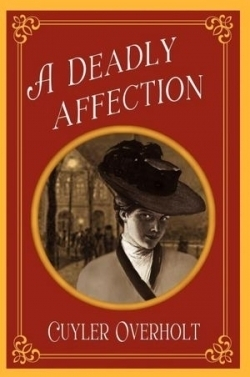A Deadly Affection
- 2012 INDIES Winner
- Gold, Mystery (Adult Fiction)
The turn of the twentieth century ushered in controversial advances in psychiatry that attracted intellectuals with an ardent desire to heal patients through the power of psychotherapy. Set in New York in 1907, A Deadly Affection offers a realistic look at a turbulent period in U.S. history from the perspective of Genevieve Summerford, a gifted doctor with a troubled past, who must clear a patient charged with killing another physician.
In this unfortunate scenario, all evidence points to Eliza Miner, the accused, which makes Summerford herself appear guilty, not only for attempting to prove the woman’s innocence, but also for actually causing the bloodthirsty crime. As the investigation progresses, what seems to be a cut-and-dried case turns into an intricate web of deception, shocking to anyone seeking a simple explanation for a deplorable, violent outburst.
Cuyler Overholt’s book is set in an era resistant to probing the mind, which is especially problematic for a woman like Summerford who is competing in a male-dominated profession and nurturing an inferiority complex fueled by a former professor: “I imagined I could feel Mayhew’s eyes on my back, full of contempt for a woman who’d had the nerve to step outside the bounds of nature to assume a man’s job. He had once said, in an anatomy lecture in which I was the only woman present, that the female brain was ‘rather too small for great intellect, but just large enough for conceit.’ As I stepped out the front door into a world newly fraught with uncertainty, I wondered for the first time if he might be right.”
The book deserves high marks for outstanding editing and Overholt’s page-turning style, which entertains as well as educates. Backed by meticulous research and presented with acute attention to detail, a novel that could have slipped into the abyss of the ordinary shines like a star in a highly competitive genre. Like a Sherlock Holmes-inspired sleuth, the protagonist resorts to more than medical science to defend her patient, giving the story a commercial edge it would have lacked in a classic literary work with little action.
The author, a former litigation attorney and business writer, employs an element of uncertainty to propel her plot and portrays Summerford as an insecure risk taker: “My previous experience with lying had not prepared me for the job of protecting Eliza. I doubted I’d persuaded the detective that I hadn’t returned to the crime scene; indeed, I was afraid that by denying it, I’d only managed to convince him that everything else I’d said was also a lie, including my belief in Eliza’s innocence.”
Even a seasoned reader of murder mysteries will be surprised at the number of false conclusions one can reach when examining a crime as complicated as the one in Overholt’s debut novel. Buried secrets and long-ago mistakes emerge in this absorbing glimpse of the developmental days of psychiatry.
Reviewed by
Julia Ann Charpentier
Disclosure: This article is not an endorsement, but a review. The publisher of this book provided free copies of the book and paid a small fee to have their book reviewed by a professional reviewer. Foreword Reviews and Clarion Reviews make no guarantee that the publisher will receive a positive review. Foreword Magazine, Inc. is disclosing this in accordance with the Federal Trade Commission’s 16 CFR, Part 255.

